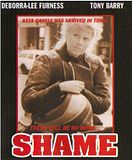Movies
SHAME
CAST
- Deborra- Lee Furness Asta Cadell
- Tony Barry Tim Curtis
- Simone Buchanan Lizze Curtis
- Margaret ford Norma Curtis
- Gillan Jones Tina Farrel
- Peter Aanensen Sergent Wal Cuddy
- David Franklin Danny Fiske
- Bill McClusky Ross
- Allison Taylor Penny
CREDITS
- Producers: Damian Parer, Paul D.Barron
- Director: Steve Jodrell
- Script writers: Beverly Blankenship, Michael Brindley
- Production Designer: Phil Peters
- Costume Designer: Noel Peters
- Editor: Kerry Regan
- Composer: Mario Millo
- Cinematography: Joseph Pickering
RUNNING TIME
- 97 minutes
RELEASE DATES
- 26th February 1998 (Perth)
- 28th April 1988 (Sydney)
- 22nd March 1989 (Video Release)
Critical Review
"A black leather clad figure on a motorcycle appears, a dot in the distance of the open road. The figure draws closer. The big engine purrs in the still open countryside. The motorcycle runs past us. The rider is ASTA CADELL..."
The film Shame, directed by Steve Jodrell is an influential and compelling film about the horror and acceptance of gang rape within a small community. The film begins with the arrival of Asta Cadell (Deborah Lee Furness) a tough, leather clad, witty female lawyer who is forced to stopover in the small country town of Ginaborak whilst waiting for her motorbike parts to arrive. From the very beginning, the gender differences in the film are apparent. The men are aggressive and portray ownership whilst the women are cowering and quiet. Although reluctant to stay in the town, Asta is offered lodgings by Tim Curtis (Tony Barry) a local mechanic and learns of the rape of his daughter Lizze (Simone Buchanan) the previous evening. As Asta befriends Lizze, she confesses that the local lad's repeatedly gang rape the women of Ginborak without any consequences. Even the law enforcement turn a blind eye to the youths who are 'highly spirited'. As the story unfolds we meet Ross and Penny, she has been ostracised from the town for speaking up about her rape and her husband is regularly harassed and beaten by the town's lads. Their mothers try to blame Lizzie for 'being too easy' and one mother tries to bribe her with clothes to stay quiet. The fathers condone their behaviour stating that 'boys will be boys'. So Lizze and Asta decide to fight back. This builds up to a huge crescendo which combines all the subplots of the film. The women of the town come together as they fight back against the rapists. Unfortunately it is all too late for Lizze. As she hides in the police station whilst the town fights the drunken lads attacking the Curtis household, two boys find her. Despite screams of help she is whisked away in their car. Lizzie tries to escape only to be thrown onto the road and killed. A tragic heart wrenching ending to this very powerful film. In the final scene the town of Ginaborak stands in silence as her body is placed in the back of a truck. The Sheriff looks at one of the women:
WAL CUDDY (Sherif): Well - I hope you're bloody satisfied.
Asta stares at him. She can't speak.
TINA: No, Wal - we're not bloody satisfied - not by a along way - 'mate'...
This final scene is an interesting end to the film. After the death of a teenager the mentality of the Sheriff stays the same. However, it is resolved that the women will no longer stand for such opinions and that there has been communal recognition of a social problem. I felt very attached to the film as I was taken along this rough journey of oppression, hatred, ignorance and fear.
The public absorbed the film in many different ways, mostly agreeably. Women and feminists felt the film was encouraging women to speak out and seek justice. The only negative reviews I could find were by men. I think this is understandable as they are more likely to have a problem with the films politics. Most negative reviews praised the film in some way yet had a problem with Asta's feminist role and felt the film entertained feminist points of view. The majority of the public, especially the women, loved Shame. In central Sydney it was the 2nd highest grossing film of 1989 (Crofts sites Parer 1990: 179). Packed out theatres were known to clap and cheer in support of the women. It also gained an important role in the overseas market. When Jodrell and Furness promoted the film in the US it really hit a nerve. Furness claims that the women who saw Shame felt it was all too tragically familiar stating that she was almost seen as a rape counsellor (cited in Croft 1998: 179). The films American distributor, Majorike Skouras reported a screening where radical feminists urged men to leave the theatre (Crofts 1998: 57). Although Asta did have a boyfriend in the film, feminist took it on board as their film of the year. They loved Asta, who was a tough independent woman who stood up to the male preconceptions of a women's place in society. Yet the film was not produced for the feminist point of view. This was Steve Jodrell's reflection for the film
"Why do people subscribe to community attitudes about rape? Why should the person who is raped immediately be treated with suspicion? (Cinema papers 1998 )
There are many factors that should encourage sceptics to look beyond the feminist's discourse to see the real problem underneath. Firstly, a male directs the film. His vision was of an action adventure film, in the true genre of a western. Secondly Shame is now used as a class text to help understand and portray the consequences of rape and the mentality of some communities. There are two central male characters that also encourage a non-feminist reading of the film. This is important, especially as a class text so that male viewers have someone to relate to. Tony Curits has a strong role in the film, as he continues to strengthen his relationship with Lizzie. Ross, the roo shooter, is also portrayed differently from the towns' lads.
Shame was faced with pressure and criticism as it made its way to the big screen. It had trouble being funded for the original story and was unable to compete in the AFI awards. Shame was written by Beverly Blakenship and Michael Brindley in 1981. When they sought funding for the film they were encouraged to change the script. The UAA a Perth Finance company and the US encouraged them to add more graphic material. They wanted to change the lead to a man, have the rape scene present and make the men more prominent. They encouraged Blankenship and Brindley to have a male hero for Asta to love and to blow the boys head of with a gun, whilst he was raping Lizzie. The scriptwriters got support from Barron Films, and the UAA finally funded the film for $1.6 million dollars without the script changing. For Shame the biggest disappointment was being unable to compete in the Australian Film institute awards. It had been entered in 1987 then withdrawn due to poor print quality and therefore deemed ineligible. 'Shame should have scooped the pool at the 1988 AFI award...The film's box-office career undoubltly suffered as a result' (Crofts cites Stratton 1993:7)

